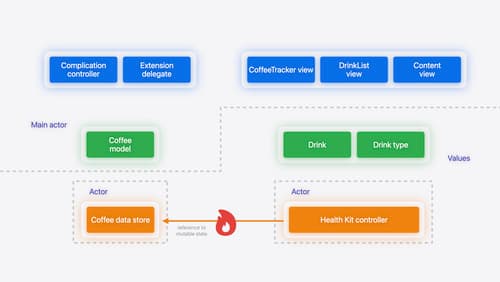How do you quiet warnings about strict swift concurrency when accessing an instance method from a main actor callback that has to capture through a non-main layer
Asked on 2024-07-30
1 search
To quiet warnings about strict Swift concurrency when accessing an instance method from a main actor callback that has to capture through a non-main layer, you can use the @MainActor annotation or the assumeIsolated method. Here are the steps you can follow:
-
Annotate the Delegate Protocol: If you have control over the delegate protocol, you can annotate it with
@MainActorto ensure that all its methods are called on the main actor. This will help the compiler understand the concurrency guarantees.@MainActor protocol CaffeineThresholdDelegate { func caffeineLevelDidChange() } -
Use
assumeIsolated: If you cannot modify the delegate protocol (e.g., it's part of a third-party library), you can use theassumeIsolatedmethod to tell the compiler that the callback is guaranteed to be called on the main actor.class MyViewModel: ObservableObject, CaffeineThresholdDelegate { @MainActor func caffeineLevelDidChange() { // This method is guaranteed to be called on the main actor assumeIsolated(self) { // Your code here } } } -
Declare the Method Non-Isolated: Another option is to declare the method as non-isolated if you know it will be called on the main actor but the protocol does not guarantee it.
class MyViewModel: ObservableObject, CaffeineThresholdDelegate { nonisolated func caffeineLevelDidChange() { Task { @MainActor in // Your code here } } }
For more detailed information, you can refer to the Migrate your app to Swift 6 session from WWDC 2024, particularly the chapter on "Delegate callbacks and concurrency".

